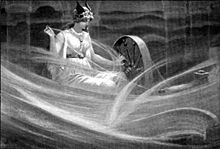Friday
[4] In the seven-day week introduced in the Roman Empire in the first century CE, the days were named after the classical planets of Hellenistic astrology (the Sun, the Moon, Mars, Mercury, Jupiter, Venus and Saturn).[5] The English name Friday comes from the Old English frīġedæġ, meaning the "day of Frig", a result of an old convention associating the Nordic goddess Frigg with the Roman goddess Venus after whom the planet was named; the same holds for Frīatag in Old High German, Freitag in Modern German, and vrijdag in Dutch.The word for Friday in most Romance languages is derived from Latin dies Veneris or "day of Venus" (a translation of Greek Aphrodī́tēs hēméra, Ἀφροδίτης Ἡμέρα), such as vendredi in French, venres in Galician, divendres in Catalan, vennari in Corsican, venerdì in Italian, vineri in Romanian, and viernes in Spanish and influencing the Filipino biyernes or byernes, and the Chamorro betnes.This name had been given by the Jewish community exiled to the island in order to designate the food specifically prepared for Shabbat eve.In languages of Islamic countries outside the Arab world, the word for Friday is commonly a derivation of this: (Malay Jumaat (Malaysia) or Jumat (Indonesian), Turkish cuma, Persian/Urdu جمعه, jumʿa) and Swahili (Ijumaa).Like Saturday (Savvato, Σάββατο) and Sunday (Kyriaki, Κυριακή), Friday is named for its liturgical significance as the day of preparation before Sabbath, which was inherited by Greek Christian Orthodox culture from Jewish practices.In Japanese, 金曜日 (きんようび, kinyōbi) is formed from the words 金星 (きんせい, kinsei) meaning Venus (lit.[9][10] In the 19th century, Admiral William Henry Smyth described Friday in his nautical lexicon The Sailor's Word-Book as: The Dies Infaustus, on which old seamen were desirous of not getting under weigh, as ill-omened.[16][17][18] Traditionally, Roman Catholics were obliged to refrain from eating the meat of warm-blooded animals[19] on Fridays, although fish was allowed.The 1983 Code of Canon Law states: The Book of Common Prayer prescribes weekly Friday fasting and abstinence from meat for all Anglicans.[23][24][17] In Methodism, the Directions Given to Band Societies (25 December 1744) mandate for all Methodists fasting and abstinence from meat on all Fridays of the year.For the Orthodox, Fridays throughout the year commemorate the Crucifixion of Christ and the Theotokos (Mother of God), especially as she stood by the foot of the cross.In Hinduism, special observances are practiced for forms of the Devi, such as Durga, Lakshmi, Saraswati, Kali, Parvati, Annapurna, Gayatri, or Santoshi Mata on Friday.






Friday (disambiguation)ThursdaySaturdayISO 8601BahrainUnited Arab EmiratesSaudi ArabiaKuwaitIsraelJohn Charles DollmanOld EnglishOld High GermanGermanOld NorseLow GermanFaroeseSwedishNorwegianDanishFreyjaThe distinction between Freyja and FriggRomance languagesἈφροδίτηςFrenchGalicianCatalanCorsicanItalianRomanianSpanishFilipinoChamorrop-CelticWelsh languagePortugueseRomance languageSardinianislandShabbatArabicTurkishPersianSundaySabbathGreek Christian OrthodoxChristian fast dayScottish GaelicIcelandicHebrewIndian languagesShukraBengaliBengali CalendarJapaneseKorean languageHangulRomanizationChineseNahuatlQuetzalcoatlSlavic languagesBelarusianBulgarianPolishRussianSerbo-CroatianSlovakSloveneUkrainianHungarianPannoniannasal vowelsWilliam Henry Smythurban legendHMS FridayFriday the 13thChristianHebridesGood FridaypotatoRoman CatholicsResurrectionCrucifixionastrologyastrologicalTaurusFriday fastEasterlacticiniarefrain from eating the meatFilet-O-FishLou GroenMcDonald'sfranchiseCincinnati, OhioRoman Catholicepiscopal conferencespenance1983 Code of Canon LawAsh WednesdayBook of Common PrayerAnglicansMethodismEastern Orthodox Churchfast daysabstinencepoultrydairy productsfeast daycooking oilolive oilCrucifixion of ChristTheotokosMother of GodOctoekhosTheotokiadismissalQuakersBhriguKavyamataHinduismLakshmiSaraswatiParvatiAnnapurnaGayatri
